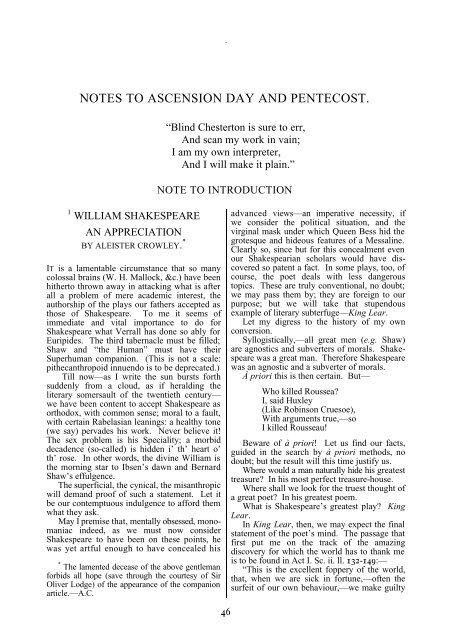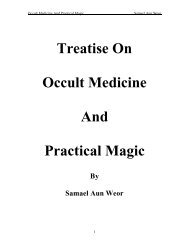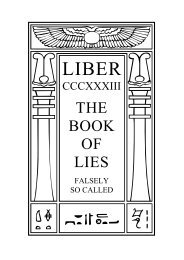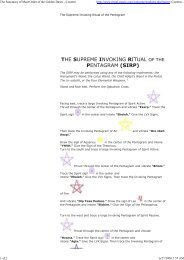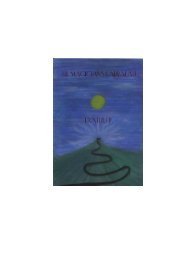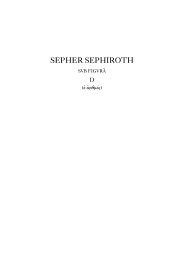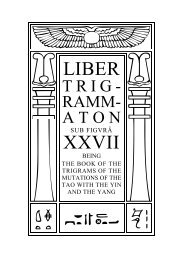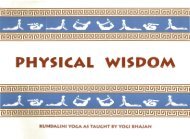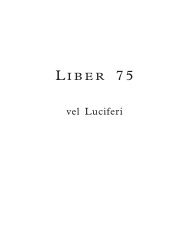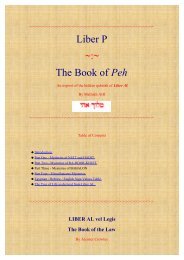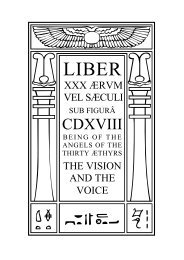Liber 67 (pdf) - Koyote the Blind
Liber 67 (pdf) - Koyote the Blind
Liber 67 (pdf) - Koyote the Blind
You also want an ePaper? Increase the reach of your titles
YUMPU automatically turns print PDFs into web optimized ePapers that Google loves.
NOTES TO ASCENSION DAY AND PENTECOST.<br />
“<strong>Blind</strong> Chesterton is sure to err,<br />
And scan my work in vain;<br />
I am my own interpreter,<br />
And I will make it plain.”<br />
NOTE TO INTRODUCTION<br />
1 WILLIAM SHAKESPEARE<br />
AN APPRECIATION<br />
BY ALEISTER CROWLEY. *<br />
IT is a lamentable circumstance that so many<br />
colossal brains (W. H. Mallock, &c.) have been<br />
hi<strong>the</strong>rto thrown away in attacking what is after<br />
all a problem of mere academic interest, <strong>the</strong><br />
authorship of <strong>the</strong> plays our fa<strong>the</strong>rs accepted as<br />
those of Shakespeare. To me it seems of<br />
immediate and vital importance to do for<br />
Shakespeare what Verrall has done so ably for<br />
Euripides. The third tabernacle must be filled;<br />
Shaw and “<strong>the</strong> Human” must have <strong>the</strong>ir<br />
Superhuman companion. (This is not a scale:<br />
pi<strong>the</strong>canthropoid innuendo is to be deprecated.)<br />
Till now—as I write <strong>the</strong> sun bursts forth<br />
suddenly from a cloud, as if heralding <strong>the</strong><br />
literary somersault of <strong>the</strong> twentieth century—<br />
we have been content to accept Shakespeare as<br />
orthodox, with common sense; moral to a fault,<br />
with certain Rabelasian leanings: a healthy tone<br />
(we say) pervades his work. Never believe it!<br />
The sex problem is his Speciality; a morbid<br />
decadence (so-called) is hidden i’ th’ heart o’<br />
th’ rose. In o<strong>the</strong>r words, <strong>the</strong> divine William is<br />
<strong>the</strong> morning star to Ibsen’s dawn and Bernard<br />
Shaw’s effulgence.<br />
The superficial, <strong>the</strong> cynical, <strong>the</strong> misanthropic<br />
will demand proof of such a statement. Let it<br />
be our contemptuous indulgence to afford <strong>the</strong>m<br />
what <strong>the</strong>y ask.<br />
May I premise that, mentally obsessed, monomaniac<br />
indeed, as we must now consider<br />
Shakespeare to have been on <strong>the</strong>se points, he<br />
was yet artful enough to have concealed his<br />
* The lamented decease of <strong>the</strong> above gentleman<br />
forbids all hope (save through <strong>the</strong> courtesy of Sir<br />
Oliver Lodge) of <strong>the</strong> appearance of <strong>the</strong> companion<br />
article.—A.C.<br />
advanced views—an imperative necessity, if<br />
we consider <strong>the</strong> political situation, and <strong>the</strong><br />
virginal mask under which Queen Bess hid <strong>the</strong><br />
grotesque and hideous features of a Messaline.<br />
Clearly so, since but for this concealment even<br />
our Shakespearian scholars would have discovered<br />
so patent a fact. In some plays, too, of<br />
course, <strong>the</strong> poet deals with less dangerous<br />
topics. These are truly conventional, no doubt;<br />
we may pass <strong>the</strong>m by; <strong>the</strong>y are foreign to our<br />
purpose; but we will take that stupendous<br />
example of literary subterfuge—King Lear.<br />
Let my digress to <strong>the</strong> history of my own<br />
conversion.<br />
Syllogistically,—all great men (e.g. Shaw)<br />
are agnostics and subverters of morals. Shakespeare<br />
was a great man. Therefore Shakespeare<br />
was an agnostic and a subverter of morals.<br />
À priori this is <strong>the</strong>n certain. But—<br />
Who killed Roussea?<br />
I, said Huxley<br />
(Like Robinson Cruesoe),<br />
With arguments true,—so<br />
I killed Rousseau!<br />
Beware of à priori! Let us find our facts,<br />
guided in <strong>the</strong> search by à priori methods, no<br />
doubt; but <strong>the</strong> result will this time justify us.<br />
Where would a man naturally hide his greatest<br />
treasure? In his most perfect treasure-house.<br />
Where shall we look for <strong>the</strong> truest thought of<br />
a great poet? In his greatest poem.<br />
What is Shakespeare’s greatest play? King<br />
Lear.<br />
In King Lear, <strong>the</strong>n, we may expect <strong>the</strong> final<br />
statement of <strong>the</strong> poet’s mind. The passage that<br />
first put me on <strong>the</strong> track of <strong>the</strong> amazing<br />
discovery for which <strong>the</strong> world has to thank me<br />
is to be found in Act I. Sc. ii. ll. 132-149:—<br />
“This is <strong>the</strong> excellent foppery of <strong>the</strong> world,<br />
that, when we are sick in fortune,—often <strong>the</strong><br />
surfeit of our own behaviour,—we make guilty<br />
46


